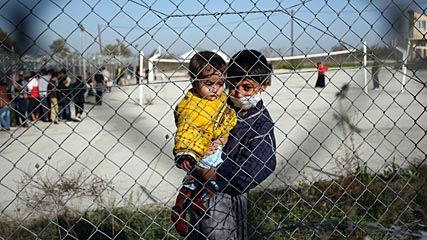ISTANBUL, Turkey — The United States is not the only country searching for ways to control its borders. In hopes of stopping the entry of thousands of illegal immigrants, Greece has announced plans to build a fence along its porous border with Turkey, its neighbor to the east.

Originally, the fence was to be 128 miles long. However, after heavy media criticism in which the proposed fence was compared to the one along sections of the U.S.-Mexico border, it was reduced to just 8 miles long and 9 feet high along the weakest point of the border, near the Greek town of Orestiada.
According to Greek Public Order Minister Christos Papoutsis, more than 100,000 people entered Greece illegally last year. The country was reportedly the only member of the European Union that saw illegal immigration rise last year.
“The Greek public has gone beyond its limits in terms of its capacity to welcome illegal migrants,” Papoutsis said, according to Greek news agency Ana. “Greece cannot take it anymore. We plan to build a barrier on the land border to block unauthorized immigration.”
The plan has drawn the condemnation of the human rights organization Amnesty International. “It’s clearly a European confession of failure,” Amnesty’s Wolfgang Grenz told a German newspaper Monday. Grenz said that by allowing Greece to build the fence, the EU would break its own principles regarding human rights.
Both the Turkish government and the European Commission have said that border protection is a matter for states to decide themselves.
An average of 200 illegal immigrants reportedly crossed into Greece from Turkish soil every day in 2010. They mainly came from Afghanistan, Pakistan and Africa. Many were seeking asylum as refugees within the EU. Others were migrant laborers seeking work inside the EU.
About 90 percent of all illegal immigrants that enter the EU come through Greece, according to officials.
In November, EU Rapid Border Intervention Teams (RABITs) were deployed along the Greek border. However, their effectiveness as a deterrent to illegal immigrants was called into question, as many of the people crossing into Greece actually sought out authorities to speed up their entry into the EU asylum system.
Metim Corabatir, a spokesman for the Office of the United Nations High Commissioner for Refugees (UNHCR) in Turkey, told AOL News in a phone interview that while every country had a right to protect its borders, fences do not deter illegal immigrants
“Building fences do not solve this kind of problem fully,” Corabatir said. “We should not forget that there are people moving for different reasons. Some are economic migrants. There are also people seeking protection. For this region, border control managers must be sensitive to the needs of people seeking protection.”
Situated at a geographical crossroads, Turkey has long been one of the primary stops along the road to the West. Partly due to often criticized immigration laws and the lengthy time it takes to apply for asylum through the UNHCR, most asylum seekers make Turkey a transit point and seek asylum within the EU by crossing illegally into Greece.
According to Corabatir, while Greece grew more frustrated last year over the flood of illegal immigrants, the total number of people crossing over from Turkey was not up. “If you compare the figures, there has not been a big change in the number of people who have been trying to enter Greece through Turkey. What has changed is the route,” he said.
Previously, illegal immigrants tried to reach Greece through the Aegean Islands between Turkey and Greece. Corabatir said there was a shift to the land border as Greece took better control of its sea borders with the help of the EU.
The total number of people who enter Turkey every year illegally is unknown. Most leave Turkish territory quickly, and the only figures available come from Turkish authorities, who Corabatir says detain an estimated 50,000 to 60,000 illegal entrants every year. Some academics estimate that Turkey has between 200,000 and 400,000 illegal migrants entering the country every year.
Even if asylum seekers were granted refugee status in Turkey, Corabatir said, the UNHCR would still seek to resettle them in third countries. “They cannot stay in Turkey forever and enjoy full refugee rights,” he said. “Their access to social benefits and the right to work is very limited in Turkey.”
Despite this, the number of people seeking refugee status in Turkey had increased in recent years. In a trend that might bring relief to Greece, Turkey’s economy is developing rapidly, and immigrants who are focused on work possibilities as supposed to refugee status are finding more opportunities there.
“In some cities like Istanbul and Izmir, some people will earn money and be happy,” said Corabatir. “This is a new phenomenon. We think Turkey will become more of a target country for economic migrants.”
via AOL

Leave a Reply